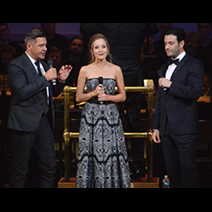The New York Pops
The Musical World of Lerner and Loewe
Carnegie Hall, NYC, October 14, 2016
Reviewed by Alix Cohen for Cabaret Scenes

Photo: Maryann Lopinto
Music by Frederick Loewe warms Stern Auditorium like an old friend. Alan Jay Lerner’s lyrics float through our heads conjuring images of stage/film musicals and personal memories. We’re on familiar, iconic ground and happy to be here, helmed by Musical Director/Conductor Steven Reineke (Arrangements by Johnny Green).
The New York Pops begins its 34th season with an evening of songs from five musicals written by Lerner and Loewe, four beloved, one lesser-known: Camelot (1960), Paint Your Wagon (1951), Gigi (1958), Brigadoon (1947), and My Fair Lady (1956). Guest vocalists include Laura Osnes, Colin Donnell, Nathan Gunn and Essential Voices USA (Judith Clurman, Music Director/Conductor).
We begin with Gunn’s rendition of the title song from “Camelot,” a show whose pre-sale set the record. The performer offers engaging, battleworn reflection. “What Do the Simple Folk Do?” follows, with Osnes playing Queen Guinevere to Gunn’s King Arthur. The couple whistle, sing, and dance—personality without fuss. Donnell’s “If Ever I Would Leave You” is less successful. While his light tenor is later effective, this song calls for deep resonance.
Paint Your Wagon is represented by a rumba arrangement of “I Talk to the Trees,” clearly not evoking western plains where the musical takes place. Gunn’s much too fast “They Call the Wind Maria” is robbed of yearning, and the chorus does a rousing, yeehaw! version of “There’s a Coach Comin’ In”/“I’m on My Way.” The best in this group is Osnes’ infectiously excited, deftly modulated “How Can I Wait?”
From the beloved Gigi, written first for the screen, we hear: Osnes’ lilting, hopeful “Say a Prayer for Me Tonight” [originally written for, but cut from, My Fair Lady] with its last note flying off like a small bird; a choral interpretation of “The Night They Invented Champagne” replete with popping cork; Osnes and Gunn’s “I Remember It Well,” which the former acts and the latter simply sings; and Gunn’s “Gigi,” lacking both surprise and excitement detailed in the lyrics.
The exhilarating overture from Brigadoon, Lerner and Loewe’s first major hit, finds our audience swaying in its seats and tapping its feet. Donnell’s “Come to Me, Bend to Me” is simply lovely, gentle and rife with ardor. Equally fine, his “I’ll Go Home with Bonnie Jean” (with the chorus as townspeople) is full-blooded and youthfully optimistic.
Gunn and Osnes’ duets, “The Heather on the Hill” and a bright “Almost Like Bring in Love,” are next. Though Gunn has a beautiful voice, he could use a director here. He’s better with this partner who gets the artist more involved.
Called “the perfect musical,” we close with selections from My Fair Lady. Osnes has played Eliza Doolittle. Her confident soprano soars with these songs, even though accent lacks. The actress effortlessly takes us with her. Choral backup buoys “Wouldn’t It Be Loverly.” A snappy “Show Me” arrives dramatically believable, as does her joyous, expansive “I Could Have Danced All Night.”
All three artists sing “The Rain in Spain” with some appealing playacting. The Essential Voices chorus delivers a muscular “Get Me to the Church on Time” as if playing against Alfred P. Doolittle’s (absent) solo. Donnell performs “On the Street Where You Live” with the dulcet longing of a male ingénue. Gunn gives us “I’ve Grown Accustomed to Her Face” with the same weary, conversational effectiveness with which he began this evening.
We close with a reprise of “I Could Have Danced All Night” to which many assembled off stage sing along. This evening is a reminder of the richness of our musical theater heritage, the universality and timelessness of its best efforts.





